S. Scott Whitaker's Blog, page 18
September 8, 2013
Author Spotlight: Tad Richards
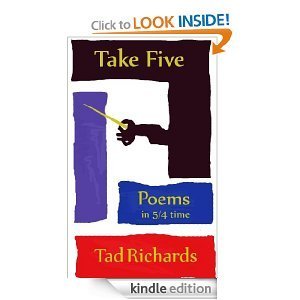
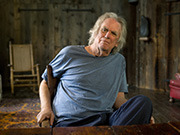
Field Recordings welcomes Tad Richards , the celebrated poet, painter, and artistic director of Opus 40 , a sculpture park in Saugerties, New York. Richards work stretches back to the 1960s and has written a variety of work in a variety of fields. You can read more about Tad Richards career here and connect with Tad Richards here .
Name: Tad Richards
Pen Name: Same
Most recent title published: Fiction – Nick and Jake (Arcade Books), poetry – Take Five: Poems in 5/4 Time (eFitzgerald e-publishers)
Where do you write? I can’t stay in 0ne place. I move around, sometimes within the space of a single peom.
What are your rituals with regards to writing (ex: Must have tea, a cat on the lap, etc) Hard to imagine writing without coffee. And I must have a pen that I really like – a Micron, a Tech-Liner, or failing that an ultra-thin Sharpie or a Pilot Precise.
Describe your writing process: I start in longhand in 6x9 sketchbook. Every time I come to a halt (this is poetry – fiction a little different), I start again, copying everything I’ve already written onto a new page.
What do you when you begin to revise? What's the first thing you do during that process? My revision process begins when I turn that first page in my sketchbook and begin recopying – and revising what I’ve written.
When revising, how many drafts do you go through before you feel comfortable with the final product? – All of which adds up to “no way to count the number of drafts.” I’m revising all the way through the first draft. After I get to the end of the poem, it probably doesn’t go through more than a couple more drafts.
When arranging lines for your poems, what do you consider at the micro level-- about the line? (For example...I never end a line on the word “and” etc.) Depends on whether I’m writing in form or free verse, but I don’t have any rules for what I will or won’t end a line with. Even when I’m writing free verse, I’m aware of a sort of loose accentual count, which governs the shape of a line.
As a poet, whose music, or voice, sometimes do you hear as you write or revise? My two great mentors were Donald Finkel and Donald Justice, and I still hear their voices.
How would you classify your poetry? Are you a lyric poet? A Romantic? A Surrealist? I’m a storyteller. Even if I’m writing something as counter-narrative as a villanelle, I’m still a storyteller.
What poets are you currently reading? Nancy Willard, Halvard Johnson, Keats, Yeats.
What poets/poems do you strongly recommend a reader to discover? “Questions My Son Asked Me, Answers I Never Gave Him,” by Nancy Willard, “Beyond the Hunting Woods” by Donald Justice, “Burden” by Donald Finkel, “Poetry of Departures” by Philip Larkin, are poems that never fail to move me. A less well-known poet who should be discovered by lots more people – Annette Basalyga. Her book is “Lifer.”
The contemporary American poetic tradition is elegy, do you discover elegiac qualities among your own writing as a whole? Are you a poet of loss? Well, Yeats said the only subjects worth writing about are sex and death, and they’re both about loss, so yeah.
Where does your inspiration come from (music, film, other books)? Words. Combinations of words that strike me. They can come from anywhere. One example – a character said this in a Tarzan movie I was watching on Saturday morning. I wrote it down, lived with it for a while, and it became the first stanza of a poem: “They used to practice cannibalism, until they went away from the river when the colonists came. It’s said they have some power over the crocodiles.”
What is your literary guilty pleasure? (trashy sci-fi adventures, bad romance novels, 50 Shades, fanfic, etc.) Country music (not the new stuff), mystery novels.
Explain how your local and regional environment influences your writing, your process, and your product (in other words, how does your reality intersect with the worlds that you create?): I live at a place that is constantly inspiring, Opus 40 in Saugerties, New York.
You have to invite three authors to dinner, who are they? Why? Can they be friends I haven’t seen in a long time? Marvin Bell, Fred Koller, Annette Basalyga. Otherwise – Proust (assuming a universal translator like on Star Trek), Rabelais (someone’s got to tell the dirty jokes), Edna St. Vincent Millay.
Favorite title (you wish you had come up with): How I Made A Million Dollars in Real Estate in My Spare Time.
Line(s) you wish you wrote: Yeats: “A line may take us hours maybe / Yet if it does not seem a moment’s thought / Our stitching and unstitching has been nought.”
Book you did not read in high school but now have read and have an appreciation for: And why: Middlemarch, because it’s so rich and subtle. Proust, because he is the greatest novelist ever.
Favorite words: Rhythm and blues.
Least favorite words: Right now, twerk.
Advice you would like to pass on to other writers: It’s the doing, the making, that counts. Nothing counts without that.
What you would discuss with your pet if your pet could talk: Food, probably.
Published on September 08, 2013 03:00
September 7, 2013
Indie Author Spotlight: Joan Colby
Field Recordings welcomes poet and indie author Joan Colby to the internet wilds. By “indie” Field Recordings means independent: working with small and regional presses, smaller imprints of large publishing houses, self-published, and e-published.
Name: Joan Colby
Most recent title published: Selected Poems
Where do you write? Anywhere and everywhere.
What are your rituals with regards to writing (ex: Must have tea, a cat on the lap, etc) I don’t have rituals, unless writing first drafts in longhand qualifies.
Describe your writing process: As I mention above, I write in longhand. When an idea or image comes into my head, I try to write it down before it can escape into the ether.
What do you when you begin to revise? What's the first thing you do during that process? I revise as I write. My drafts are covered with cross-outs, scribbles, insertions, etc. When I have something that seems finished, I type it into my computer. I may then have up to 5-6 additional versions.
When revising, how many drafts do you go through before you feel comfortable with the final product? That depends upon the poem. Some arrive fully fledged, as a given, and the trick is to recognize that and not wreck it. Others may average 2-3 drafts, keeping in mind that I revise extensively in the process of writing the first draft.
When arranging lines for your poems, what do you consider at the micro level-- about the line? (For example...I never end a line on the word “and” etc.) Recently, I’ve been interested in placing a stressor word at the start of a line rather than the end of one. I’ve also begun (over the past few years) capping the first letter of each line (something I never did in my earlier work) as I like how one can jolt a reader—maybe stop him in his tracks, rather than have the lines flowing along smoothly (and too often boringly).
As a poet, whose music, or voice, sometimes do you hear as you write or revise? I hear the voice in my head that dictates the poem—sometimes my own, sometimes that of a persona.
How would you classify your poetry? Are you a lyric poet? A Romantic? A Surrealist? I don’t like labeling myself, or limiting my output to a particular genre. While most of my poems are free-verse, I also like writing sestinas and sonnets.
What poets are you currently reading? At the moment, I’m rereading Neruda and Eliot. And tons of stuff in the many contrib. copies I get—I recently discovered the work of Martin Willetts Jr. and want to read more of his poetry.
What poets/poems do you strongly recommend a reader to discover? I would need about 100 pages just to begin. Start with Shakespeare and Donne. Whitman. Derek Walcott. Yusuf Komunyakaa, Ted Hughes “Crow”, Greg Orr’s “Gathering the Bones”. Andrew Marvell’s “To His Coy Mistress”…you get the idea.
The contemporary American poetic tradition is elegy, do you discover elegiac qualities among your own writing as a whole? Are you a poet of loss? Well, like most poets, I certainly write poems about loss, probably a lot of them. The two big subjects; Love and death.
Where does your inspiration come from (music, film, other books)? Whatever comes into my head. My background as a journalist makes me prone to noticing things.
What is your literary guilty pleasure? (trashy sci-fi adventures, bad romance novels, 50 Shades, fanfic, etc.) Karin Fossum’s Norwegian mysteries starring Inspector Sejer.
Explain how your local and regional environment influences your writing, your process, and your product (in other words, how does your reality intersect with the worlds that you create?):Since I live on a small horse farm , have spent years breeding, raising and training Thoroughbreds, and since I have for nearly 30 years edited the magazine Illinois Racing News, many of my poems focus on horses, the brutal realities of country life, the natural world, et al.
You have to invite three authors to dinner, who are they? Why? Mark Twain. Walt Whitman. William Faulkner. We would have a spirited conversation. Drinks too.
Favorite title (you wish you had come up with):Everything That Rises Must Converge.
Line(s) you wish you wrote: In the room the women come and go/talking of Michelangelo.
Book you did not read in high school but now have read and have an appreciation for: And why: Anna Karenina which I consider the world’s greatest novel.
Favorite words: Depends on the context.
Least favorite words: See above.
Advice you would like to pass on to other writers: Write., Read. Write.
What you would discuss with your pet if your pet could talk: Her obsession with catching the Kong.
Name: Joan Colby
Most recent title published: Selected Poems
Where do you write? Anywhere and everywhere.
What are your rituals with regards to writing (ex: Must have tea, a cat on the lap, etc) I don’t have rituals, unless writing first drafts in longhand qualifies.
Describe your writing process: As I mention above, I write in longhand. When an idea or image comes into my head, I try to write it down before it can escape into the ether.
What do you when you begin to revise? What's the first thing you do during that process? I revise as I write. My drafts are covered with cross-outs, scribbles, insertions, etc. When I have something that seems finished, I type it into my computer. I may then have up to 5-6 additional versions.
When revising, how many drafts do you go through before you feel comfortable with the final product? That depends upon the poem. Some arrive fully fledged, as a given, and the trick is to recognize that and not wreck it. Others may average 2-3 drafts, keeping in mind that I revise extensively in the process of writing the first draft.
When arranging lines for your poems, what do you consider at the micro level-- about the line? (For example...I never end a line on the word “and” etc.) Recently, I’ve been interested in placing a stressor word at the start of a line rather than the end of one. I’ve also begun (over the past few years) capping the first letter of each line (something I never did in my earlier work) as I like how one can jolt a reader—maybe stop him in his tracks, rather than have the lines flowing along smoothly (and too often boringly).
As a poet, whose music, or voice, sometimes do you hear as you write or revise? I hear the voice in my head that dictates the poem—sometimes my own, sometimes that of a persona.
How would you classify your poetry? Are you a lyric poet? A Romantic? A Surrealist? I don’t like labeling myself, or limiting my output to a particular genre. While most of my poems are free-verse, I also like writing sestinas and sonnets.
What poets are you currently reading? At the moment, I’m rereading Neruda and Eliot. And tons of stuff in the many contrib. copies I get—I recently discovered the work of Martin Willetts Jr. and want to read more of his poetry.
What poets/poems do you strongly recommend a reader to discover? I would need about 100 pages just to begin. Start with Shakespeare and Donne. Whitman. Derek Walcott. Yusuf Komunyakaa, Ted Hughes “Crow”, Greg Orr’s “Gathering the Bones”. Andrew Marvell’s “To His Coy Mistress”…you get the idea.
The contemporary American poetic tradition is elegy, do you discover elegiac qualities among your own writing as a whole? Are you a poet of loss? Well, like most poets, I certainly write poems about loss, probably a lot of them. The two big subjects; Love and death.
Where does your inspiration come from (music, film, other books)? Whatever comes into my head. My background as a journalist makes me prone to noticing things.
What is your literary guilty pleasure? (trashy sci-fi adventures, bad romance novels, 50 Shades, fanfic, etc.) Karin Fossum’s Norwegian mysteries starring Inspector Sejer.
Explain how your local and regional environment influences your writing, your process, and your product (in other words, how does your reality intersect with the worlds that you create?):Since I live on a small horse farm , have spent years breeding, raising and training Thoroughbreds, and since I have for nearly 30 years edited the magazine Illinois Racing News, many of my poems focus on horses, the brutal realities of country life, the natural world, et al.
You have to invite three authors to dinner, who are they? Why? Mark Twain. Walt Whitman. William Faulkner. We would have a spirited conversation. Drinks too.
Favorite title (you wish you had come up with):Everything That Rises Must Converge.
Line(s) you wish you wrote: In the room the women come and go/talking of Michelangelo.
Book you did not read in high school but now have read and have an appreciation for: And why: Anna Karenina which I consider the world’s greatest novel.
Favorite words: Depends on the context.
Least favorite words: See above.
Advice you would like to pass on to other writers: Write., Read. Write.
What you would discuss with your pet if your pet could talk: Her obsession with catching the Kong.
Published on September 07, 2013 03:00
September 6, 2013
Indie Author Spotlight: Anthony Watkins
Field Recordings welcomes Southern poet Anthony Watkins to the internet wilds. Watkins has published poems in Poetry Super Highway, Stellar Showcase of Canada, and has written papers for the Treasure Coast of Florida. Most recently he was the Poetry! Goodreads Group Poet of the month.
Name: Anthony Watkins
Pen Name: Anthony Watkins
Most recent title published: My most recent collection of poems was Warm Enough for Ice Cream (2011) Lemonade Press
Where do you write? In my Wingback chair, on my third or 4th one by now. For the longest I almost exclusively wrote while driving. Yeah, I know, but that is what I did, and I drove a lot, so I had lots of time to write. I couldn’t begin to write on a computer. I would have to retype everything, and my hand writing is so terrible if I didn’t rewrite it in a day or two it was lost, because I couldn’t read it. Somewhere, I think it was while I was writing my first novel, currently and probably forever unpublished, I realized I had to work at the computer, also, somewhere along the way, I started using a laptop so I moved to my chair with a padded writing lapdesk.
What are your rituals with regards to writing (ex: Must have tea, a cat on the lap, etc) I have no ritual, usually I think of something or see something and write it immediately, but sometimes I will get an idea and I let it ferment, of course sometimes I get an idea and lose it waiting, though something else usually comes along
What do you when you begin to revise? What's the first thing you do during that process? As often as not, I don’t revise, well, I revise as I write, but sometimes I will come back and see something I don’t like, but usually, I say what I want to say as I go, at least in poetry, now fiction is another story. I publish everything almost instantly on Shelfari : , on Facebook, on Goodreads (Goodreads link 2) : and: , my blog: and email to certain folks, if I get negative feedback about a word of a line or a whole stanza, I will look at it again, and usually rework it then.
When arranging lines for your poems, what do you consider at the micro level-- about the line? (For example...I never end a line on the word “and” etc.) Subconsciously, I have developed a lot of rules. They are probably easier to see as a reader than they are to me. I don’t like to break lines in non traditional places. I like for stanzas to end with a period, though they don’t always. Mostly I write it down and if I can sing it, I like it. When I was a college student I tried to listen to what my teachers taught me about meter, yes I was still rhyming back then, too. But whenever I worked at it, I got it backwards, if I sang it, everybody was happy. Not that I EVER sing in front of other people. I cant sing, I am a poet, not a lyricists, though I did go to Nashville back about 1981-1982 and called on a bunch of song publishing houses until I realized I wasn’t a songwriter.
As a poet, whose music, or voice, sometimes do you hear as you write or revise?
Mine
How would you classify your poetry? Are you a lyric poet? A Romantic? A Surrealist? I write little pictures, I consider myself a snapshot poet. Somebody else will have to put a better label on me.
What poets are you currently reading? I love Brenda Black White and James Lancaster, Billy Collins, a bit of Anne Sexton, and enjoying a lot of fellow poets at Poetry! on Goodreads. I tried to fit in over at Erastophere, but they aren’t my kind of people, or at least I’m not theirs
What poets/poems do you strongly recommend a reader to discover?
Themselves, by that I mean read everybody, don’t feel like you have to follow anybody, but get sincere, cut the crap. A poet must first do the very best to say whatever it is they are trying to say, not with flourishes or meter or rhyme nor anything that prevents them from telling the truth of the world they see. In my opinion, the best use of reading others’ poems is to learn their tricks and not repeat them.
The contemporary American poetic tradition is elegy, do you discover elegiac qualities among your own writing as a whole? Are you a poet of loss?
I find loss to be a complete waste of time, a poem must be the living thing, the having, the possession of what is and what was in a present state.
Where does your inspiration come from (music, film, other books)? The lives of strangers, friends and myself, of small woodland creatures, of these I am inspired.
What is your literary guilty pleasure? (trashy sci-fi adventures, bad romance novels, 50 Shades, fanfic, etc.) I love a good murder mystery, a Robert B. Parker, Martha Grimes, Elmore Leonard or Dick Francis, though I also love more traditional literary fiction, my contemporary favorites in Gloria Naylor, Barbara Kingsolver, and Graham Greene, but I think it is the tradition of Faulkner, Welty and Agee that has inspired my word choices and thought processes.
Explain how your local and regional environment influences your writing, your process, and your product (in other words, how does your reality intersect with the worlds that you create?): I write what I see the street people, the politician, the school child or the shop keeper.
You have to invite three authors to dinner, who are they? Why? Tough question, as I am very fond of Woolf, Faulkner, and Naylor, but I am not certain I would have enjoyed any of their company. As far as good dinner companions, give me Graham Greene, Tim Dorsey, Willa Cather, and see if we could have Daphne du Maier slipped in while no one was watching!
Book you did not read in high school but now have read and have an appreciation for: And why: To Kill a Mockingbird As a kid growing up in Alabama, I was given to believe that this book was a corrupting influence. As a grown man, I found it to be the book, besides Go Down Moses that I most wished I had written!
Favorite words:
My wife has a list of both, but I have never understood have a favorite or least word, as they are all tools in the arsenal of the writer
Advice you would like to pass on to other writers: Ignore advice from other writers
What you would discuss with your pet if your pet could talk: why she insists on going out every 5 minutes only to stand at the door a minute later to be let in again. I don’t think she thinks deep thoughts, of course I could be wrong, I don’t speak dog. I have often wondered if an ant stands on its hill and contemplates the absolute briefness of its existence, does it wish for more, does it know it has only a handful of days? Does it have a cognitive life as a pupae? Who knows?
Name: Anthony Watkins
Pen Name: Anthony Watkins
Most recent title published: My most recent collection of poems was Warm Enough for Ice Cream (2011) Lemonade Press
Where do you write? In my Wingback chair, on my third or 4th one by now. For the longest I almost exclusively wrote while driving. Yeah, I know, but that is what I did, and I drove a lot, so I had lots of time to write. I couldn’t begin to write on a computer. I would have to retype everything, and my hand writing is so terrible if I didn’t rewrite it in a day or two it was lost, because I couldn’t read it. Somewhere, I think it was while I was writing my first novel, currently and probably forever unpublished, I realized I had to work at the computer, also, somewhere along the way, I started using a laptop so I moved to my chair with a padded writing lapdesk.
What are your rituals with regards to writing (ex: Must have tea, a cat on the lap, etc) I have no ritual, usually I think of something or see something and write it immediately, but sometimes I will get an idea and I let it ferment, of course sometimes I get an idea and lose it waiting, though something else usually comes along
What do you when you begin to revise? What's the first thing you do during that process? As often as not, I don’t revise, well, I revise as I write, but sometimes I will come back and see something I don’t like, but usually, I say what I want to say as I go, at least in poetry, now fiction is another story. I publish everything almost instantly on Shelfari : , on Facebook, on Goodreads (Goodreads link 2) : and: , my blog: and email to certain folks, if I get negative feedback about a word of a line or a whole stanza, I will look at it again, and usually rework it then.
When arranging lines for your poems, what do you consider at the micro level-- about the line? (For example...I never end a line on the word “and” etc.) Subconsciously, I have developed a lot of rules. They are probably easier to see as a reader than they are to me. I don’t like to break lines in non traditional places. I like for stanzas to end with a period, though they don’t always. Mostly I write it down and if I can sing it, I like it. When I was a college student I tried to listen to what my teachers taught me about meter, yes I was still rhyming back then, too. But whenever I worked at it, I got it backwards, if I sang it, everybody was happy. Not that I EVER sing in front of other people. I cant sing, I am a poet, not a lyricists, though I did go to Nashville back about 1981-1982 and called on a bunch of song publishing houses until I realized I wasn’t a songwriter.
As a poet, whose music, or voice, sometimes do you hear as you write or revise?
Mine
How would you classify your poetry? Are you a lyric poet? A Romantic? A Surrealist? I write little pictures, I consider myself a snapshot poet. Somebody else will have to put a better label on me.
What poets are you currently reading? I love Brenda Black White and James Lancaster, Billy Collins, a bit of Anne Sexton, and enjoying a lot of fellow poets at Poetry! on Goodreads. I tried to fit in over at Erastophere, but they aren’t my kind of people, or at least I’m not theirs
What poets/poems do you strongly recommend a reader to discover?
Themselves, by that I mean read everybody, don’t feel like you have to follow anybody, but get sincere, cut the crap. A poet must first do the very best to say whatever it is they are trying to say, not with flourishes or meter or rhyme nor anything that prevents them from telling the truth of the world they see. In my opinion, the best use of reading others’ poems is to learn their tricks and not repeat them.
The contemporary American poetic tradition is elegy, do you discover elegiac qualities among your own writing as a whole? Are you a poet of loss?
I find loss to be a complete waste of time, a poem must be the living thing, the having, the possession of what is and what was in a present state.
Where does your inspiration come from (music, film, other books)? The lives of strangers, friends and myself, of small woodland creatures, of these I am inspired.
What is your literary guilty pleasure? (trashy sci-fi adventures, bad romance novels, 50 Shades, fanfic, etc.) I love a good murder mystery, a Robert B. Parker, Martha Grimes, Elmore Leonard or Dick Francis, though I also love more traditional literary fiction, my contemporary favorites in Gloria Naylor, Barbara Kingsolver, and Graham Greene, but I think it is the tradition of Faulkner, Welty and Agee that has inspired my word choices and thought processes.
Explain how your local and regional environment influences your writing, your process, and your product (in other words, how does your reality intersect with the worlds that you create?): I write what I see the street people, the politician, the school child or the shop keeper.
You have to invite three authors to dinner, who are they? Why? Tough question, as I am very fond of Woolf, Faulkner, and Naylor, but I am not certain I would have enjoyed any of their company. As far as good dinner companions, give me Graham Greene, Tim Dorsey, Willa Cather, and see if we could have Daphne du Maier slipped in while no one was watching!
Book you did not read in high school but now have read and have an appreciation for: And why: To Kill a Mockingbird As a kid growing up in Alabama, I was given to believe that this book was a corrupting influence. As a grown man, I found it to be the book, besides Go Down Moses that I most wished I had written!
Favorite words:
My wife has a list of both, but I have never understood have a favorite or least word, as they are all tools in the arsenal of the writer
Advice you would like to pass on to other writers: Ignore advice from other writers
What you would discuss with your pet if your pet could talk: why she insists on going out every 5 minutes only to stand at the door a minute later to be let in again. I don’t think she thinks deep thoughts, of course I could be wrong, I don’t speak dog. I have often wondered if an ant stands on its hill and contemplates the absolute briefness of its existence, does it wish for more, does it know it has only a handful of days? Does it have a cognitive life as a pupae? Who knows?
Published on September 06, 2013 03:00
September 2, 2013
Indie Author Spotlight: Ruth Bavetta
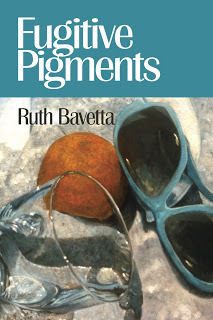
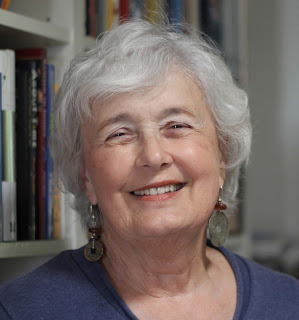
Field Recordings welcomes poet and author, Ruth Bavetta, to the internet wilds. Bavetta's work has appeared in dozens of journals and literary reviews. Bavetta has a new book of ekphrastic poetry (one of my fav modes of composition) out, Fugitive Pigments, and two new books forthcoming from Moontide Press and Tebot Bach, respectively. Links to Ruth Bavetta's work can be found throughout. Happy exploring.
Name: Ruth Bavetta
Pen Name: Ruth Bavetta
Most recent title published: Fugitive Pigments , a book of poems about art and other poems that resonate with them, published by FutureCycle Press. I was a professional artist for years before I started writing poetry. In this book I bring together the worlds of poetry and art. These are ekphrastic poems, instructive poems, poems riffing off the principles of art—the art of living, of shading, perspective, colors; how to create an exquisite corpse, and what one should know about shadows. I speak in the voice of Joseph Cornell, address Alice Neel, wake up under a sky painted by Andrea Mantegna. I write of making art, looking at art, teaching art—teaching people to see.
My book, Embers on the Stairs is due in 2014 from Moontide Press, http://www.moontidepress.com/ and after that, Tebot Bach, http://www.tebotbach.org/ , will bring out my book, No Longer at This Address, which is about my mother and her slide into dementia.
Where do you write? In my studio/office, with a view over the Pacific. All that openness refreshes me.
What are your rituals with regards to writing: I have no particular rituals. I just tell myself to stop procrastinating and do it.
Describe your writing process: I usually write at the computer. Before I had a computer, it was mostly on the typewriter. Not as romantic as scribbling in a well-worn notebook, but I like that I can write faster. It enables me to at least try to keep up with my thoughts. Because I am also a visual artist how the poem looks on the page is important to me. I get a sense of that immediately when using the computer.
If I am in a writing slump, I often sign up for one of Molly Fisk’s Poem-a-Day sessions where participants must respond to a new prompt every day for a month. It’s a good way for me to throw caution out the window and just write.
What do you when you begin to revise? No special process. Sometimes I even do a little revising during my first draft.
What's the first thing you do during that process? Try to read the poem as if I hadn’t written it. Does it say what I think it does? Then cut, cut, cut. My first drafts tend to be wordy. Look at the sounds of the words, do I have any slant rhymes? Should I have more? Twitch the line breaks. Move things around.
When revising, how many drafts do you go through before you feel comfortable with the final product? Impossible to count. Sometimes a poem is plopped into my lap fully formed liked Athena from the brow of Zeus, sometimes it languishes in my Unfinished folder for 10 years. Or more.
As a poet, whose music, or voice, sometimes do you hear as you write or revise? I concentrate on the poem I’m writing. I don’t want anybody hanging over my shoulder trying to guide my fingers.
How would you classify your poetry? Are you a lyric poet? A Romantic? A Surrealist? I guess you’d have to call me a lyric poet.
What poets are you currently reading? I seldom concentrate on certain poets. I flit about like a honeybee, grabbing books from here and there and reading a few poems at a time. There are always plenty of poetry books around the house calling to me. I also do a lot of browsing on the internet. Right now the book beside my bed is Joan Colby’s Selected Poems. She can come up with metaphors like Schubert came up with melodies, just shaking them out of her sleeve.
What poets/poems do you strongly recommend a reader to discover? I’d have to know the reader first.
The contemporary American poetic tradition is elegy, do you discover elegiac qualities among your own writing as a whole? Are you a poet of loss? I think I am. It may be at least in part because of my age. As one nears the end of life there is a tendency to look back at what has been.
Where does your inspiration come from (music, film, other books)? If I knew where my inspiration came from, I’d draw water from that well every day.
Explain how your local and regional environment influences your writing, your process, and your product (in other words, how does your reality intersect with the worlds that you create?): I’ve lived all my life in Southern California and my poems are often inextricably linked to that landscape—the sea, the chaparral-covered hills, the sun.
You have to invite three authors to dinner, who are they? Why? MFK Fisher, EB White, Mark Doty, hoping their conversation would be as graceful as their writing.
Line you wish you wrote: “…winds to shake a dead rabbit's satchel of bones.” (Gary Soto)
Book you did not read in high school but now have read and have an appreciation for: And why: I’m 78 years old and you’re expecting me to remember high school?
Favorite words: Mojave, eucalyptus, Pacific…
Least favorite words: I literally hate literally.
Advice you would like to pass on to other writers: Don’t wait for inspiration. She’s a fickle tart. Just write.
What you would discuss with your pet if your pet could talk: Alas, the hamster died 35 years ago, three of the cats were probably consumed by coyotes, the fourth died of old age. The sheepdog died and then the beagle. The kids grew up.
You can connect with Ruth Bavetta at Goodreads and Barnes and Noble.
Published on September 02, 2013 03:00
September 1, 2013
Indie Author Spotlight: M.W. McKay
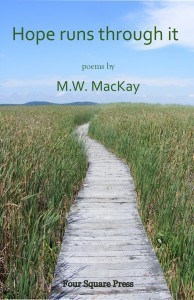
Field Recordings welcomes New Englander, freelance editor and writer, M.W. McKay, to the internet wilds. You can connect with McKay throughout the feature. McKay has even teased us with a poem towards the end of the interview. Please take some time and explore.
Name:
Margaret Eckman
Pen Name:
M. W. MacKay
Most recent title published:
Hope Runs Through It , published by Four Square Press (foursquarepress.com)
Where do you write?
I write at my desk, in my office. Boring, I know, but it’s a place I associate with work (I’m a freelance editor), so I can make myself get down to writing. I think of ideas for poems all over the place; the trick is to remember those ideas while they’re fresh enough so I know what kind of thing I want to write about, and then to make myself actually sit down and write.
What are your rituals with regards to writing (ex: Must have tea, a cat on the lap, etc):
I don’t have much in the way of rituals. If a poem is coming on strong, I try to write it down as soon as I can; otherwise, I just try to stop delaying and start writing. (I can endlessly delay; there’s always something else that just must be done).
By the way, the cat does try and worm his way onto my lap and knock my hands off the keyboard—most annoying!
Describe your writing process:
I try and get a first draft of a poem finished without doing too much revising, although I find myself playing with words and sounds on a first draft even as I’m trying to find the right feel and rhythm for the poem. Every now and then, I can almost write what I want in one go, but that’s a rare pleasure.
What do you when you begin to revise? What's the first thing you do during that process?
Before attempting to revise, I leave a poem alone for at least for a few hours, typically a day or two—but not much longer than that, or I may end up abandoning it. Then I reread. I listen to the sound and rhythm and work on areas that sound clunky; I see if what I’m saying feels like a truth, or if it’s just a collection of pretty (or not so pretty) words. And then I take it to my writers’ group and let them tear it apart.
When revising, how many drafts do you go through before you feel comfortable with the final product?
I typically go through three or four drafts. Sometimes I’ll come back to a poem I wrote quite a while ago and completely rework it; it’s hard to say if the end result is yet another draft or a new poem.
As a poet, whose music, or voice, sometimes do you hear as you write or revise?
At times, I hear the voices of some of my favorite poets in my ear. I try to tune that out and pay attention to what I need to say; it can be hard! As for music, each poem creates its own music, and I try to tune in to that.
How would you classify your poetry? Are you a lyric poet? A Romantic? A Surrealist?
Yikes. I typically write free verse, but I pay as much attention to sound as sense. I’ve written poems in several forms (sonnet, haiku, villanelle, sestina, etc.) just for the fun of it; I like the sonnet form best because it requires such rigor.
When I write a poem, I want to tell a complete story in a few well-composed lines, and I want a reader to find all that’s needed in the poem itself to take something meaningful from it. I want the reader to connect with the poem. I dislike poetry that ignores the reader, that’s so idiosyncratic that only someone who knows the poet’s life story—or knows the poet personally—has any shot at getting the references and, in turn, getting anything worthwhile from the poem.
Does that explanation classify my poetry in any way? I don’t know!
What poets are you currently reading?
I bounce from book to book, and read the daily poems from “The Writer’s Almanac.” Louise Glück’s The Seven Ages is on my bedside table right now.
What poets/poems do you strongly recommend a reader to discover?
I love Billy Collins; he’s just fun! Even if you think you just don’t get poetry, I think you’ll enjoy reading his books. David Whyte; his poems are so moving. And I recommend everyone read “Kindness” by Naomi Shihab Nye. What an amazing poem.
The contemporary American poetic tradition is elegy, do you discover elegiac qualities among your own writing as a whole? Are you a poet of loss?
Can you lament something you’ve never had? I have a mentally ill son; he’s quite intelligent (and funny), but has some crippling disabilities. He’s my only child. So I mourn the loss of what could have been. But I have to look for the hope (hence the title of my book), for him and for the world, or I’ll go crazy. I think that, even though it’s in my nature to write from loss, it’s also in my nature to look for and write about that thread of hope.
Where does your inspiration come from (music, film, other books)?
I’m definitely inspired by other poets. Reading a beautiful, well-written poem can get me off my ass and writing again. I’m “inspired” by my son in the sense that writing about some of my experiences with him helps me to cope, to understand him better, and to (sometimes) find meaning in those very difficult experiences. Nature inspires me, but I struggle to find ways to write about it that don’t come off as trite. The search for meaning (and maybe God?) pushes me to write.
Explain how your local and regional environment influences your writing, your process, and your product (in other words, how does your reality intersect with the worlds that you create?):
I grew up in New York City, but I’m a New Englander at heart. Right now, I live by the ocean, and it finds its way into many poems. And the reality of my life with my son permeates my writing.
You have to invite three authors to dinner, who are they? Why?
Do I have dinner with them one at a time, or is this a dinner party? What the heck: let’s have a party! Italo Calvino because of his lunatic imagination (read If On A Winter’s Night A Traveler for a wild ride), Madeleine L’Engle because her books took me on trips to other worlds when I was growing up (I read A Wrinkle in Time countless times), and Billy Collins because he’d be fun.
Favorite title (you wish you had come up with):
A Heartbreaking Work of Staggering Genius. What a title!
Line you wish you wrote:
This lovely last line from the poem “Faith” by David Whyte:
Let this then, my small poem,
like a new moon, slender and barely open,
be the first prayer that opens me to faith.
Book you did not read in high school but now have read and have an appreciation for: And why:
Hmmm, I can’t really think of one book. Can I go for poetry as a genre? I never read poetry in high school (unless forced to). I don’t think I had the patience even to look at much poetry in high school.
Favorite words:
“Grace” is one of my favorite words. “Melange” has a lovely sound, although I don’t think I’ve ever used it in a poem.
Least favorite words:
Utilize, monies, facilitate, prioritize—any jargony word. They just clunk.
Advice you would like to pass on to other writers:
The usual: find a time and place to write, read a lot (I mean a LOT), and find other writers to work with (my writers’ group keeps me writing).
What you would discuss with your pet if your pet could talk:
With my cat Ralph: how delicious Eli the chinchilla looks, how much he’d like to have the Eli for breakfast, and how important it is not to eat fellow residents of the household.
With my chinchilla Eli: how delicious Timothy hay is, how much fun it is to twirl around in a dust bath, and how important is it to stay away from Ralph.
A poem about the two pets:
Siege
A cat contemplates dinner
The warrior stretches to reach his full height.
Ten inches of valor, of fury and fight.
He faces the feline, the silent black beast
that stares at the cage, contemplating its feast.
The warrior leaps, lightning movements a blur.
The beast tries to follow the gray streak of fur.
Its golden eyes widen to witness such rage.
Its velvet paw twitches, moves toward the cage.
The twitch triggers frenzy, the cage starts to rattle.
The warrior’s ready to fight his last battle.
The feline’s less sure though; it eyes the sweet prize,
and ponders the perils of something that size.
The beast leaps to safety, gives up on the fray.
Chinchilla won’t be on the menu today.
Published on September 01, 2013 03:00
August 31, 2013
Indie Author Spotlight: Monisha Annabel Jador
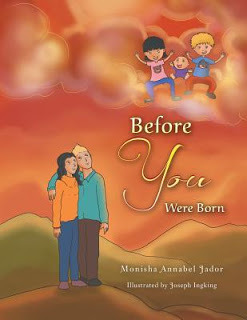
Field Recordings welcomes Australian author Monisha Annabel Jador to the internet wilds. I hope you are relaxing and reading something meaningful to you this Labor Day Weekend. Jador is the author of Before You Were Born, children's verse about parenting, love, and wonder.
Name: Monisha Annabel Jador
Title: Before You Were Born
Where do you write?
I have four favourite places to write in. Java Lave cafe, at my favourite table, right in the corner, at the end. I love City Extra, as the moon dappled waters trickle beneath the parked ferries, just before the all night cafe, for the late nighters like myself, as they serve their tea, mine is Earl Grey with milk and try to tell me of their gluten free bread, fresh baked, to the smiles of the beautifully hearted staff, who know me by now. There is another place that I love to write in. A little cafe with an eclecticism that touches my heart on a sunny winter's morning as I write and finally a little tea house, set in Hornsby, NSW, Australia, that has inspired my second children's book.
What are your rituals with regards to writing (ex: Must have tea, a cat on the lap, etc)
I need to have a cup of French Earl Grey or just any tea loose leaf, and I must be seated at my favourite tables in any of these cafes.
Describe your writing process:
I prefer to write with music, even as the ideas come to me and then the story moulds into shape. Sometimes I find myself wrestling with the tales as I want it written in a certain way and then i feel the breath of the story and the pictures flow. The words feel and I write.
What do you when you begin to revise? What's the first thing you do during that process?
I look for words that are repetitive and then try to remove them or replace them with words of the same meaning. I see rhythm and feel flow, so the words must not jag with sharp angles. but if they have to, then I create a flow for the contrast. I also ensure that the story has a life. I am also one of my own worst critics at times. The main thing is the story is alive, shows its colours and speaks from its heart. I keep it that way.
When revising, how many drafts do you go through before you feel comfortable with the final product?
As I write for children, I would say three or four, but for my first one, I was comfortable with it straight away.
As a poet, whose music, or voice, sometimes do you hear as you write or revise?
The music just flows from somewhere as do the voices speaking my words, as I write. Many a time I hear the drawing irritation of my own mother's voice and its edge as it slices through my skin and bares my nerves, and dances on the very last of them as I write. I also see the large brown eyes that swallowed my name once, as I write.
How would you classify your poetry? Are you a lyric poet? A Romantic? A Surrealist?
I am not too sure. I guess I can be a lyrical, romantic poet. A surrealist, well, there might be some surrealistic tendencies in my poetry, but not much. Most of it is almost artistic, as I have been told.
What poets are you currently reading?
The poets on Goodreads just for now.
What poets/poems do you strongly recommend a reader to discover?
The poem from Seven Pillars of Wisdom. Passion, longing, lingering flame, beneath his touching gaze through his verse.
Where does your inspiration come from (music, film, other books)?
Life.
Explain how your local and regional environment influences your writing, your process, and your product (in other words, how does your reality intersect with the worlds that you create?)
Well, my environment moves my innermost feelings and needs, amongst desire. I grew up with pain, so I move words with pain. I know love so loves enshrouds my world. I know desire, abandonment, gender preference, racism, which was not always directed at me. I feel the name of my own background throbbing through my veins and I can hear voices of my past telling me to be proud of that one part of me, ignoring the others. I can hear their opinions from within me. However I smell the flicker of their fabric and spice of their scent, the warm sweet milk, freshly milked cows, a taste not forgotten, from that part of me as I taste the hot, nourishing stews and feel the tang of salads from Portuguese traditions and see the strong Dutch lines in our height, bloodline, all mixing with India in our vessels. The Irish eyes that sparkle from my daughter's smile and the hills of Ireland roll within my younger daughter's eyes are also aspects that move me.
You have to invite three authors to dinner, who are they? Why?
Charles, from Goodreads. He is fascinating. Kathy Lette, she is funny and of course Khaled Hosseini, his life in Afghanistan speaks of a love that the world rarely sees from the country. Of course if Lawrence of Arabia were alive, I would beg to make allowances. The five of us could have a feast filled with passion, wit, laughter, literary entertainment.
Favorite title (you wish you had come up with): There are too many to mention
Line you wish you wrote: There are too many, that paint pictures of a forlorn rose, darkened petals bleeding tears upon a lover's absconded heart.
Book you did not read in high school but now have read and have an appreciation for: And why: I was an avid reader in high school. However if I must, Seven Pillars of Wisdom. It beats within my heart now. Had I read it as a student, I would have rioted.
Favorite words: They are scattered through verse
Least favorite words: Maths.
Advice you would like to pass on to other writers: Write in the way that is yourself.
What you would discuss with your pet if your pet could talk: Life, his form. Her heart. Dreams, wishes.
Published on August 31, 2013 03:00
August 30, 2013
Indie Author Spotlight: A.R. Sara
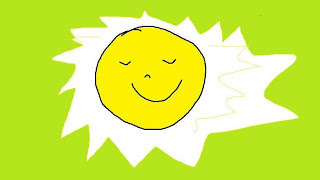
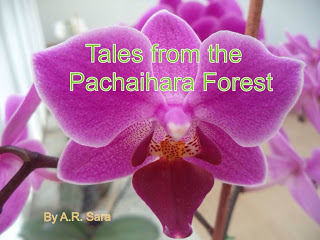
Happy Labor Day Weekend. We welcome A.R. Sara , children's writer, to the internet wilds. Links to connect with A.R. Sara are peppered throughout the feature. Please explore.
A.R. Sara, Author of story books for children of all ages!
Name: RajaRajeshwari Nagasigamani
Pen Name: A.R. Sara
Most recent title published: Morban from Garalond (#3 in the Pachaihara Forest series)
Where do you write?
On my iPad , my computer or sometimes even a scrap of paper will do. Location is my room or my car but I tend to lose track of the surroundings once I get into flow of writing.
What are your rituals with regards to writing (ex: Must have tea, a cat on the lap, etc)
Listening to some music, closing my eyes and trying to still my thoughts to unwind is slowly growing to be a regular ritual before my writing sessions. Recently, munching on a bar of chocolate is threatening to take over as a writing ritual.
Describe your writing process:
I let myself get transported into the fictional forest of fantasy, Pachaihara. I allow my imagination to take over and let my thoughts flow free. Then I just start to pen down the story as if it were unfolding right before my eyes. I feel like an invisible observer and narrator who is allowed into this surreal world of fantasy and it is exhilarating experience.
What do you when you begin to revise? What's the first thing you do during that process?
The very first thing I do is to ensure I make copies and backup of the original or the most current version. I follow the same procedure for every revision.
When revising, how many drafts do you go through before you feel comfortable with the final product?
I go through an iterative process of reading it aloud and making changes that feel necessary. I just rely on my inner voice to guide me, on when to stop.
As a writer, whose music, or voice, sometimes do you hear as you write or revise?
I hear voices of my loved ones. Sometimes I could almost hear the fictional characters from my stories carry on the conversations in real time as and when I am writing them down.
How would you classify your poetry? Are you a lyric poet? A Romantic? A Surrealist?
I don't consciously try to be one or the other. As I go back and take a look at the poems I have written over the years I guess I am a bit of all three.
What poets are you currently reading?
Currently reading poems by Lord Tennyson, Robert Frost and Nissim Ezekiel all over again
What poets/poems do you strongly recommend a reader to discover?
Recently I am finding out that there is a whole new exciting world of undiscovered poetry by poets both known and known. Thanks to all the different poetry forums, blogs, online sites, readers have the privilege to have a glimpse and browse through some of the amazing poetry out there that was previously inaccessible. I would recommend readers to carry out an exploration of these poetry sites.
The contemporary American poetic tradition is elegy, do you discover elegiac qualities among your own writing as a whole? Are you a poet of loss?
There tends be a melancholic edgy feel to some of my poems. But as a whole I feel my poems tend to range from light hearted, uplifting, romantic to intense and inspirational.
Where does your inspiration come from (music, film, other books)?
I draw my inspiration from multiple sources, my kids being the catalyst who got me started on this path of writing and publishing. I have been an avid reader of fiction since the time I began to read and music has been a constant companion too. But the seed was planted early on by my parents, thanks to all the bed time stories I listened to as a child.
The initial idea for the Pachaihara forest was sparked off during a lively story telling session with my kids about a fictional forest of fantasy.
Explain how your local and regional environment influences your writing, your process, and your product (in other words, how does your reality intersect with the worlds that you create?):
All the different cultures I have been exposed to in my life as well as my immediate surroundings influence my writing style as well as the characterization.
The characters and the premise of the story are fictional based on fantasy, but rooted in reality when it comes to the emotions expressed.
You have to invite four authors to dinner, who are they? Why?
Enid Blyton
Roald Dahl
J.R.R Tolkien
Edith Nesbit
Irrespective of their different writing styles and other unique features I appreciate, I feel their books are timeless. Stories with elements of reality interwoven so very finely, stories that have the ability to transport you to another world. It would be an honour to invite them for dinner. I would invite four or more rather than three, more the merrier, ie., if they decide to accept my dinner invite.
I would love to find out if all four of them would be interested in doing a joint book project.
Favorite title (you wish you had come up with):
Too many titles I love, but difficult to pick a favorite. Can't think of a title I wish I had come up with, as the potential for coming up with unique titles feels limitless.
Line you wish you wrote:
Can't think of one that I wish I had written, though I have several favorite lines from various books I have read several times over.
Book you did not read in high school but now have read and have an appreciation for: And why:
Charlie and the Chocolate Factory is a book I got to read only recently and I am so glad I did.
It is a book that made me appreciate and thoroughly enjoy the story both through the eyes of my inner child as well as a parent.
Favorite words:
Delightful, smile, happy
Least favorite words:
Most of the curse words.
Advice you would like to pass on to other writers:
Post writing and publishing, do not stop with marketing and promoting, but parallelly work out a strategy for branding your work and yourself as an author. If you are self editing, it really helps to read aloud the story, to spot anything amiss.
What you would discuss with your pet if your pet could talk:
I did not get another pet after my first pet, a Labrador passed away. I wish I had spoken to him more when he was around. He makes a guest appearance in the third book of the Pachaihara forest series and this gave me an opportunity to revisit my memories of him.
Find A.R. Sara and her fantasy novels though Amazon.
Author Bio
A.R Sara is a pen name the author RajaRajeshwari Nagasigamani coined for herself to explore her passion for writing. She considers herself a breezy & intense eternal teen with a zest for the here and the now. She resides in India with her super supportive handsome husband who is her childhood sweetheart and soul mate and her two kids. She has been considering writing for a long long time. On an impulse she went ahead and published her musings from the eighties and the first half of the nineties. Then a nudge and a push from her kids. So the "Tales From The Pachaihara Forest" took shape! Since the idea of the Tales from the Pachaihara forest took root, she feels strongly compelled to take it further. To tell the tales of the various beings that dwell this fantastic forest as well as the neighbouring Droom forest.
Learn more about her and her other books at: http://www.arsarafables.com
Published on August 30, 2013 03:00
August 27, 2013
Find publishing too commercial? Stick it to the man! Last week to sponsor August 30/30 poets!
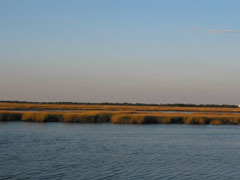 Find publishing too commercial?
Find publishing too commercial?Grant money is often tied up with politics, social or otherwise. Electronic publishing has rocked the book world, and poetry struggles to catch up.
Small presses have relied on grants to make ends meet, or to fund publishing projects that put writers, editors, and publishers to work. Tupelo Press is experimenting with writing thons, a marathon of poetry. Each month poets put pen to paper to compose 30 new poems...a poem a day...to raise donations to match a grant, and to raise awareness for small presses who struggle to adapt to a changing world.
Yeah, so? Whitman self-published Leaves of Grass. City Lights, at one time, was a small unknown press until the obscenity trial for Howl put it on the map. Imagine a poetry world without one or both of these quintessentially American books?
Tupelo Press is committed to bringing a variety of voices to print. Not every publisher can say this. Please donate, or subscribe, or purchase early Christmas presents, and help meet matching funds so that great voices do not get drowned out by commercial voices.
Check out these Facebook and blogger pages by my fellow 30/30 writers to see what we have been up to.
https://www.facebook.com/denisedragoncat
https://www.facebook.com/karenlgeo
https://www.facebook.com/#!/mariela.griffor.9
https://www.facebook.com/3030Tupelo.July?ref=stream
http://newpagesblog.blogspot.com/2013/08/the-3030-project-call-for-poets.html
Published on August 27, 2013 08:04
August 25, 2013
You can buy my breath. I've been running a poetry marathon for the last month
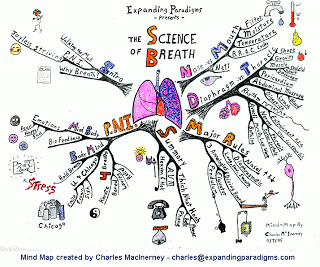
...and the final stretch is in sight. Poetry is an art form that is mostly about sounds and breath. The syllable and words a poet uses creates the music that we know as poetry. It's more than just putting words onto paper, it's about breathing, and syllabic music, and making musical choices with words that surprise, delight, and shock. I'm on the last stretch and you can buy my breath, and donate to a non-profit that helps bring great, and mostly unknown literature to light.
This is for the writers the big houses ignore. This is for the voices that the media ignores.
I encourage you to donate to Tupelo Press, or to buy a subscription, or even one of their fine books. They've got a little bit of everything for the discerning reader.
Why donate? Because it will help Tupelo Press meet a matching grant. It puts writers, publishers, editors, and printers to work. In America.
Without leaving your armchair, sofa, or desk, you can donate a dollar or two via paypal to help Tupelo Press, a non-profit organization, raise money for a matching grant. Grant money, as you know is in danger of getting cut. From the high school levels and beyond, arts organizations have to fight for grant money. Regional, community, and local arts agencies are no different. Tupelo Press, from MA, is raising funds to match a grant that will allow them to continue excellence in publishing.
Why small presses? Why Tupelo Press? First, Tupelo has a grant in the shute, and needs matching funds to get the projects started. Second, we're talking poetry (mostly) here, which does not translate well electronically. The publishing world is changing, but poetry doesn't read well on your kindle, nook, i-pad--all the lines get mashed up.
To support Tupelo Press, I'm writing a poem a day for the month of August to raise awareness and funds for a matching grant that will put writers to work.
Right now Tupelo Press has specials that will help them meet funding goals: From the Press.... nine books for 99 bucks (that's a book for you and x-mas presents for eight other people), Russian translations, photo albums, anthologies of poets talking about faith. It does not take much time, nor money to help raise money. Please visit them at http://www.tupelopress.org/ and check out their exciting titles.
Again, you can also have me write a poem for you. Make a donation and you can direct my pen, and my breath.
You can check out the progress of the 30/30 poets here.
Published on August 25, 2013 07:15
Indie Author Spotlight: Dr. Lama Milkweed L. Augustine
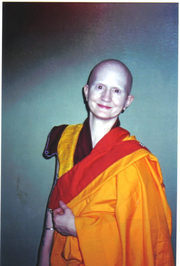
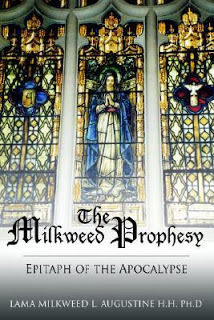
Field Recordings welcomes the distinguished Dr. Lama Milkweed L. Augustine to the wilds of the internet. Dr. Augustine has written numerous books, the most recent on death and dying. Please explore.
Lama Milkweed L. Augustine PhD
Pen name:
I use my religious title as the pen name-
Lama Milkweed L. Augustine [PhD]
Most recent title published:
My recent most published title is
"Dying and Loving It." Published in 2012.
Where do you write?
I generally have no realistic outward rituals, but rather I always do a method of "living" my books, short stories, etc, like a method actor might, especially concerning a fictional book. Of course, the nonfictional books I do not have to do anything; just write them, as well as experiencing a true and unadulterated form of emotional affect.
What are your rituals with regards to writing (ex: Must have tea, a cat on the lap, etc):
My writing process is very complicated when compared to most established authors such as myself. Meaning, where I am a highly analytical individual, especially a Buddhist religious leader, who dedicated her entire life to religion and unending theological studies and writing my own works revolving around such endeavors, it is with credible comprehension that I actually take no notes, but rather take them all inwards, and literally breathe life into all of the characters, as this is very literally a life sustaining process. I live "through" my characters, in fictional books, which permit me to truly experience, although a manufactured insight, but nonetheless, an insight about what happens out there-in normal mundane public life and humanistic relations, and all aspects of the mentioned.
Describe your writing process:
When I "revise," it is basically a fix-it concept. Meaning, where I am nearly blind, I must go over the entire work and edit, especially the small typos that I miss, but I also am able to rearrange the words making them sound better, as well as may be interpreted better for the reader. Where I am a Professor, it is often difficult for me to write in a way that will reach all of my readers. The first thing I do in this said process, is the typos-then the tying up of loose ends with grammar and adding further words of inclusion to make things further understood and viewed from my personal concepts, which are difficult for a lot of people.
What do you when you begin to revise? What's the first thing you do during that process?When revising, how many drafts do you go through before you feel comfortable with the final product?
When revisng, I only have to do one extra draft, and where I now type on a computer, although it is dying like the one who owns it, the process of writing is much better that doing it on a typewriter, which until a few years ago, was the only way I could-this computer was bought for me by someone outside of my family.
Where does your inspiration come from (music, film, other books)?
Most of my inspiration comes from my life itself; especially where I was a torture survivor held in captivity for 7 yrs. In addition, my greatest inspirations come from my life in the woods of my extremely impoverished past, especially in the 1960's and early 1970's; pinball and slot machines also grant me much inner inspiration. To humbly ad, my lifelong relationship with God and the Lord Buddha.
Explain how your local and regional environment influences your writing, your process, and your product (in other words, how does your reality intersect with the worlds that you create?):
As a survivor of brutal physical and psychological torture graphically intermingle with my books of fiction, especially my life as a religious leader and Ordained Professor, but in addition, it is the tragic fact of my physical handicaps that always invade the premises of the blank page. Being a complete shut in, due to blindness and catastrophic medical illnesses, could not help but invade the said story lines. I always accentuate my existence of never being able to drive, and being completely socially deprived, due to these things, and so much more, which are explained and exclaimed in rare manner of description; especially in my nonfiction novels. Emotions that tear and seethe are forever there in the limelight, which I do everything I can to shake the readers and force them to listen and to see the brutality I barely survived. The profound struggles no one should ever face, as even in the medical fields, I was an embalmer and medical monk, were lengthy talked about and shown to my reading audience; photographic evidence is also a good primer to such relevance.
You have to invite three authors to dinner, who are they? Why?
Stephen King, Ernest Hemingway, and Herman Melville, Why?
Stephen King, although most of his horror novels are written based on perspectives from people he has known, writes a catastrophic horror like I do, but one major difference; MINE ARE REAL and display profound warrant. Ernest Hemingway, I loved because of his deeply spiritual twist, like myself, and how he manipulates his words of intellect and a wider sense of consciousness, again like myself-humbly stated. Herman Melville, by his great book "Moby Dick," his graphic tale of "man's eternal quest for the self," my own depiction of this tale when I was 15 yyrs old, his wondrous manner of struggles and how he manipulated them in story format; the white whale was his fixation and anchoring heuristic in this ingenious read.
Favorite title (you wish you had come up with):
"The Old Man and the Sea" my favorite book ever by Ernest Hemingway. I only wish I wrote it, because of the manner of his descriptions regarding the fishing experience, but his own writing style reminds me so much of my own self. I never really thought about writing in this mildly narcissistic manner.
Book you did not read in high school but now have read and have an appreciation for: And why:
"Lord of the Flies," was one book I never got to read in high school. I appreciate it due to the face it graphically depicted mans' reverberations of a well concealed truth regarding his atavistic senses, and how, given the odd circumstances, are still there for our very survival, but in inclusion, how the kids, in the beginning, tried to work together and resolving their differences; kids are apt to battle more than adults, because of the fact kids are always struggling for independence due to the often strangulating grip of their adult peers who often think they have ti all figured out.
My favorite words were by Lord Jesus Christ,
"He who is of this world is loved by the world.
He who is not of this world is hated by the world."
[I manipulate this saying a lot in my books of nonfiction and fiction, because it edifies exactly my very life; even now.]
"Ask not what your country can do for you;
ask what you can do for your country."
By President John F. Kennedy
Advice you would like to pass on to other writers:
To never stop writing from you heart and spirit; this is the only asset we have as the representatives of God's promise of the written word of man. Words are the best kind of legacy we can offer, because WORDS are what makes us children of God.
What you would discuss with your pet if your pet could talk:
I often talked with my pet before he was taken away by a coyote; "God's endless loving endeavors and His far from ephemeral concern for His creations. The beauty, seen and unseen, and of course, my devout studies I had done while silently, and singularly, earning my Degrees at such a staggering young age. I loved my cat, his name was "Floppy Disk," because he was a gray short haired cat, but the funny ways he just "flopped" down to a lying position whether he was tired or happy.
Her Holiness;
The Most Venerable Lama Rimpoche,
Miss prof. Milkweed L. Augustine PhD DD
author, artist, pacifist leader, religious leader
[Also known as Voice for the Condemned.]
Connect with Milkweed Augustine on Goodreads.
Published on August 25, 2013 03:00



